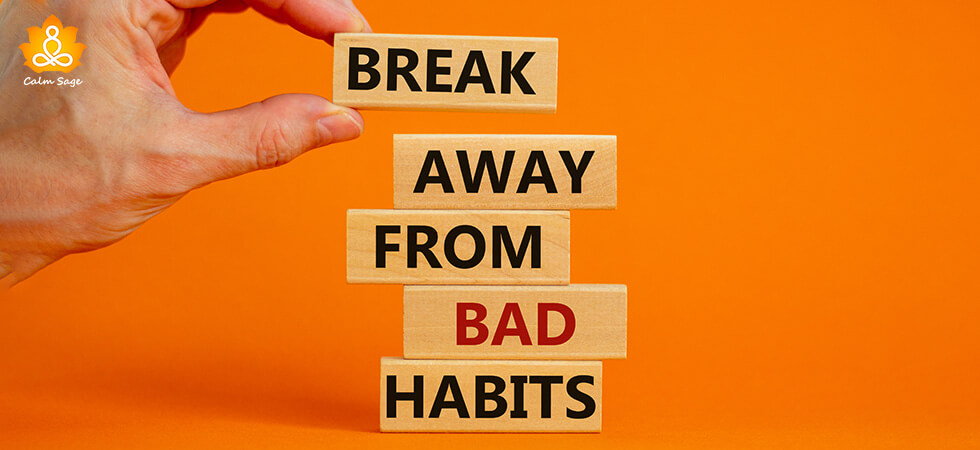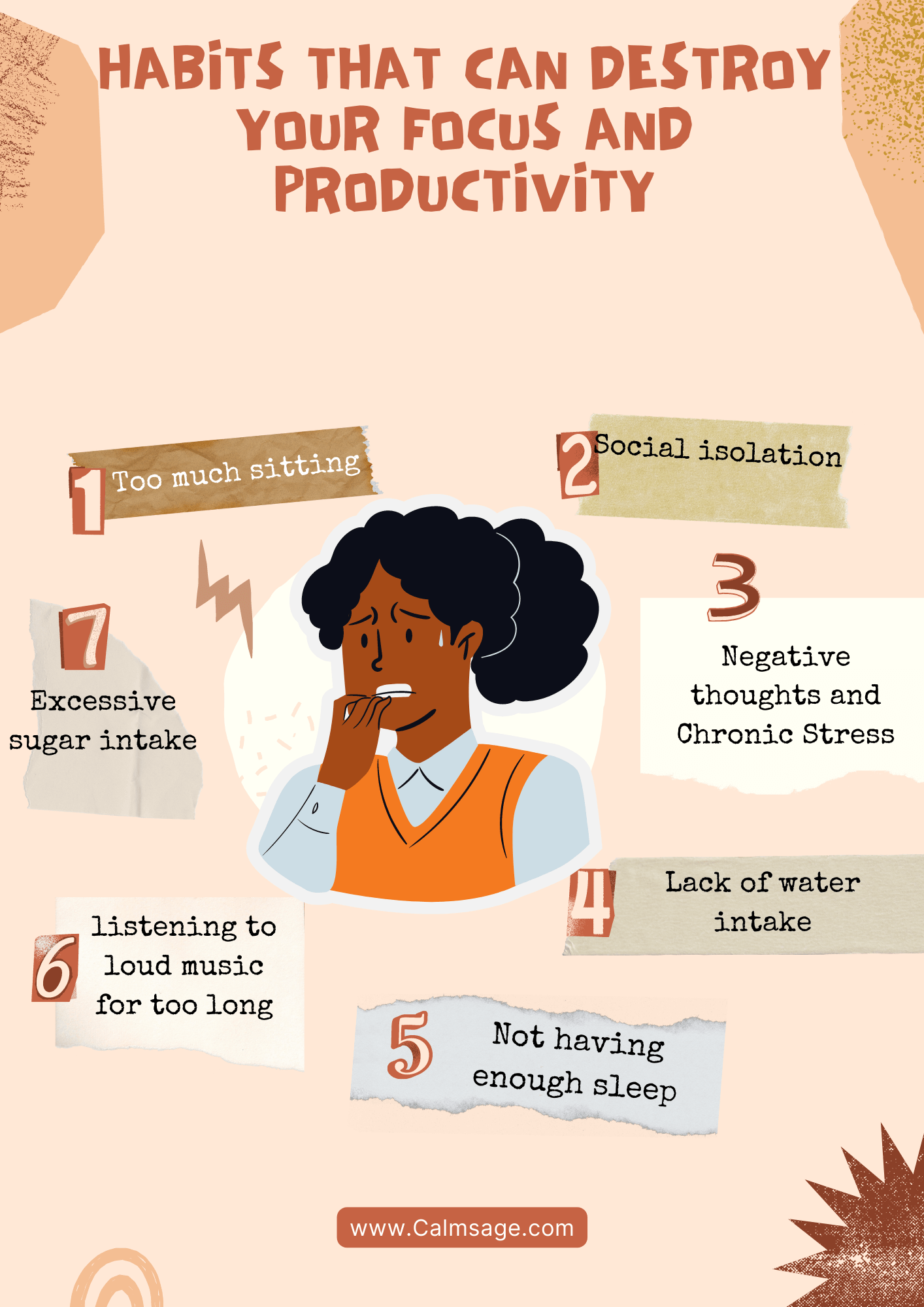Habits that Can Destroy Your Focus and Productivity

We’ve all heard habits design our life, and they make us what we are. Sometimes it feels like habits help solve life challenges, but if habits start affecting our focus and productivity, then? This is when we need to pay attention to habits that destroy our productivity and change them as they affect our physical health and mental well-being.
Life throws a lot at us; we can only deal with it if we are flexible. However, habits sometimes make us so stubborn that even if we want to change, we can’t. So before habits take control of your life and have a command over your actions, regain control over them.
In this post today, we will attempt to find out all about habits and how they affect our life and hamper productivity and focus.
What Are Bad Habits & Why Breaking Them Is Important?
If you have read or heard about the book Atomic Habits, you must have a fair idea about what habits are and how they impact our lives. Habits are the actions we perform and the decisions we make every day, accounting for 40% of our behavior and transforming our life.
However, when these involuntary responses, instead of helping us focus, concentrate, and succeed, act as a source of instant satisfaction, they negatively impact life. These habits are hard to break as they are pleasure based.
However, breaking such unproductive habits is important to be productive. Read further if you want to know about these habits and how to prevent your brain from craving bad habits.
Daily Habits that Destroy Your Productivity
Habits sit on a continuum from good to bad, yet they are categorized as good or bad. How we control habits and vice versa decides whether they are good or bad. When deeply wired in our brains, habits can be hard to change. Therefore, we need to pay attention to habits that destroy our productivity.
When a habit starts to invoke guilt, cause loss of sleep, or affect our mental and physical health, it is a red flag. These habits are bad, and you should learn how to break bad habits.
All of us engage in several habits. However, there are some habits and things that, when excessively practiced, can kill your productivity. These are some examples of bad habits & how they harm :-

1. Too much sitting
A study published in PLOS One 2018 explains the connection between excessive sitting and alterations. The study shows that prolonged sitting affects the medial temporal lobe (MTL) related to memory, causing the risk of Alzheimer’s. Also, they hinted that more time spent sitting worsens cognitive performance and memory.
So if you enjoy a sedentary lifestyle, start being active to decrease the risk of dementia. The more inactive a person is, the more the chances of him/her being anxious, depressive, or experiencing unpleasant life incidents.
The Habit Of Sitting For Long Periods Kills Productivity – Here’s How To Break It
The best way to fight these effects is to take breaks every 15 to 30 minutes and engage in physical activity. If you work from home, you can use the Pomodoro technique, which will help you focus on work and remind you to move. However, if you are a homemaker, you can use a timer to get a reminder for walking, doing push-ups, or doing yoga.
2. Social isolation
These days most people, in the name of self-love, disconnect themselves from people. This, when practiced occasionally, is okay. However, when this isolation leads to loneliness, the risk of depression and Alzheimer’s disease increases. The less social you are, the more chances of reduction in the brain’s gray matter, which is responsible for information processing, increase.
Breaking The Bad Productive Habit Of Social Isolation
To overcome this, create a social circle with two or three individuals you trust and feel comfortable sharing anything. This group will not only help deal with social isolation but will also help in venting. However, while creating such a closed group choose people wisely, as they will be your support system.
3. Lack of sleep
The Centers for Disease Control and Prevention (CDC) reports that about one-third of adults fail to meet the recommended sleep duration of seven to eight hours per night. If you fall under this category, your cognitive function, memory, reasoning, and problem-solving abilities will be negatively impacted.
Tips for dealing with breaking the daily bad habit of lack of sleep
To improve sleep quality, go to bed one hour before the usual time. This will give you extra sleep time and reduce your chances of staying late. However, if you notice that this makes you wake up in the middle of the night, do some relaxing activities like reading instead of checking your phone. This will help you go back to sleep and will relax your mind.
Lack of sleep disturbs the pathways between nerve cells and the brain that help process information. Also, you may suffer from memory loss and face problems recalling things. Hence, you should establish a consistent bedtime routine, avoid caffeine, and limit screen time before bed, this will address the inadequate sleep issue.
3. Chronic stress
Chronic stress can have damaging effects on the brain, causing the death of brain cells and shrinking the prefrontal cortex, which plays a vital role in memory and learning. In most adults, the common source of stress is the “my-way-or-the-highway” mentality. This inflexible mindset can trigger negative reactions that raise stress levels.
Breaking the bad habit of Chronic Stress
You should practice relaxation techniques like deep breathing and meditation to manage life stressors and stress. Also can take help from a therapist and can practice positive affirmations. This will help keep negative thoughts in check and prevent stress from spiraling.
4. Excessive sugar intake
Increased intake of sugar not only increases the risk of diabetes and reduces the production of brain-derived neurotrophic (BDNF). A brain chemical that helps in making new memories and learning new things. Too much sugar harms the brain.
Break this bad habit by keeping a check on your daily sugar intake. Avoid having too much soda, tea, coffee, or ice cream. Read the label when buying packed food, and if possible, replace them with fresh fruits and vegetables. Eat home-cooked meals and replace sugar with jaggery, dates, or bananas.
5. Increased screen time
We all know too much of anything is harmful, yet we forget this rule regarding screen time. If you want to stay productive and focused, limit your screen time. Too much of it affects creativity, intellect, and emotional health. Also, it causes depression, affects mental health, interrupts sleep quality, and hurts us physically.
Dealing with the bad habit of increased screen time. You can use different applications like Social Fever and others to handle the issue to limit screen time. Also, you can stop using your phone while eating food, spend time with family, and stop using electronic devices one hour before sleeping.
6. Multitasking
You might have heard people saying very proudly I am a multitasker, I can do more than one task at a time. But trust us, multitasking is not good for mental well-being. Over time, it can damage the memory center in the brain. Also, those who claim to be multitaskers are the ones who are most distracted.
They can’t focus on things longer, and they even have difficulty filtering out extraneous information. To fix it, try to focus on one task at a time. Prioritize tasks and divide the time accordingly to finish everything on time. This will increase efficiency and memory.
7. Overuse of earphone
Music is a great stress buster, but excessive use of headphones to listen to music at higher volumes is harmful. It will impair your hearing abilities and impact your social interaction. Also, you might face memory loss as the brain must put extra effort into processing sounds.
Once the hearing is damaged, there is no way to repair it. Therefore, to deal with this bad habit, listen to music at a safe volume. Listen to music with speakers, and avoid using headphones or earphones for long. Also, limit the time to listen to music and soothing music.
8. Negative thoughts
Thoughts are not in our control, but if you have a habit of thinking negatively, pay attention to it before it’s too late. Negative thinking damages brain activity leading to problems like depression, anxiety, and dementia. People who always think and talk negatively are prone to Alzheimer’s disease.
Luckily, this bad habit is not that hard to change. To keep your brain healthy and increase your attention and focus, try to look at the positive aspect of what’s happening. Change your thoughts into positive ones. Try positive affirmation. Also, you can seek help from therapists and start writing a gratitude journal.
9. Ignoring mental health
Taking care of physical health is good, but ignoring mental well-being is not good. Due to the fear of being labeled, most of us ignore conditions like hypertension, depression, stress, and overeating. This isn’t the right to do, as when these issues are left untreated, they have adverse effects on the brain and increase the chances of dementia and cognitive impairment.
Therefore, when you feel stressed or cannot handle a situation, instead of wearing that strong persona that nothing affects you or you are okay, seek help. There is no shame in asking for help. This habit of yours will not only affect your brain but will also harm your physical health. Therefore, prioritize your brain health and benefit your overall well-being.
10. Lack of water intake
Water is an essential component of our body structure and brain function. Almost 90% of our brain is made of water. Therefore, when there is a lack of water intake and more exposure to air conditioning, the brain cells start to shrink, causing several issues. Hydrate your body and drink at least 3 liters of water to address and break this bad habit.
It will also help in boosting metabolism and flush out toxins. So to increase brain activity and deal with this bad habit, start drinking water today. If you have difficulty remembering you have to drink water, use water reminder apps.
Take Charge of Your Habits & Remain Productive
We hope you have understood how habits impact and kill your productivity. So, from now on, instead of letting habits control you, control them and practice mindfulness to break bad habits. A tiny step will go a long way; start cultivating habits to remain productive.
Certainly, you won’t be able to break free from the negative habits that easily. Give it time. The effort you put in today is worth it. They will help boost mental health, increase productivity, and make you happy, giving you a sense of fulfillment.
Promise to take charge of your bad habits and make positive changes that will last a lifetime.




















